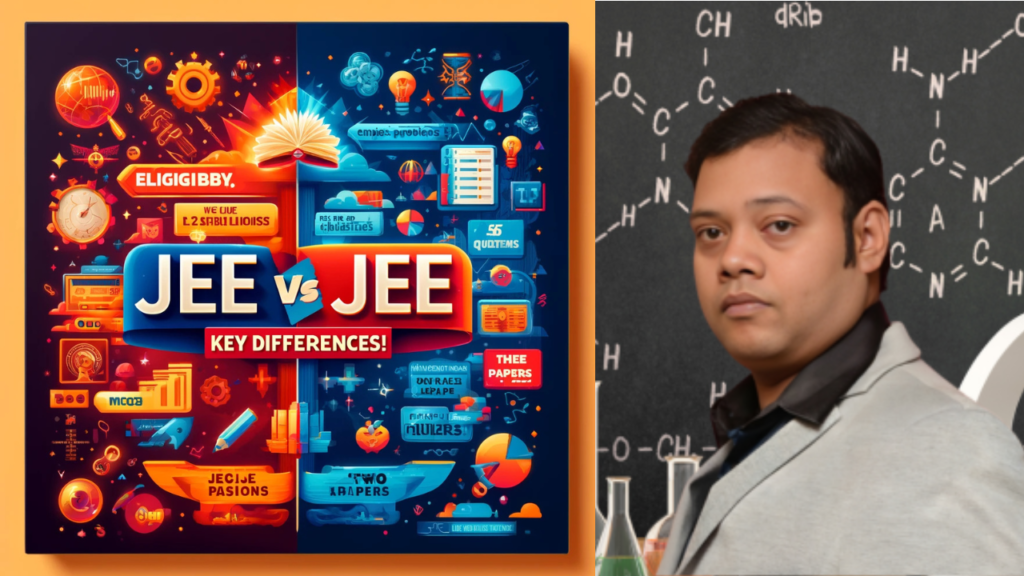
In the realm of Indian engineering education, two pivotal examinations—JEE Main and JEE Advanced—serve as gateways to prestigious institutions. For chemistry educators, understanding the nuances between these exams is essential to guide students effectively.
JEE Main: The Foundational Assessment
Eligibility Criteria:
- Academic Requirements: Candidates must have completed their Class 12th or equivalent examination with a minimum of 75% marks (65% for SC/ST candidates), including subjects like Physics, Chemistry, and Mathematics.
- Age Limit: There is no specific age restriction for general category students.
Examination Structure:
- Format: Conducted as a Computer-Based Test (CBT).
- Duration: 3 hours.
- Sections: Three sections—Physics, Chemistry, and Mathematics—each comprising Multiple Choice Questions (MCQs) and Numerical Value Questions.
Scoring and Application:
- Marking Scheme: +4 for correct answers, -1 for incorrect MCQs, and specific marking for numerical questions.
- Purpose: Serves as a qualifying exam for JEE Advanced and is also used for admissions into NITs, IIITs, and other centrally funded technical institutions.
JEE Advanced: The Pinnacle of Engineering Entrance Exams
Eligibility Criteria:
- Performance in JEE Main: Only the top 2.5 lakh candidates from JEE Main are eligible.
- Attempt Limit: Candidates can attempt JEE Advanced a maximum of two times in consecutive years.
Examination Structure:
- Format: Comprises two mandatory papers, each lasting 3 hours.
- Question Types: Includes MCQs with single or multiple correct options, numerical answer type questions, and match-the-following type questions.
Scoring and Application:
- Marking Scheme: Varies with different sections, including partial marking for certain question types.
- Purpose: Primarily for admissions into the Indian Institutes of Technology (IITs).
Key Differences Relevant to Chemistry Educators:
- Syllabus Depth:
- JEE Main: Covers fundamental concepts in Physical, Organic, and Inorganic Chemistry.
- JEE Advanced: Delves deeper into theoretical aspects and applications, requiring a robust understanding of complex chemical principles.
- Question Complexity:
- JEE Main: Questions are generally straightforward, focusing on basic application and problem-solving skills.
- JEE Advanced: Features multi-conceptual problems that demand analytical thinking and a deeper comprehension of chemical phenomena.
- Preparation Strategy:
- JEE Main: Emphasizes speed and accuracy, with a focus on NCERT textbooks and standard problem-solving techniques.
- JEE Advanced: Requires an in-depth study plan, including advanced reference materials, extensive practice with complex problems, and a focus on conceptual clarity.
Guidance for Chemistry Educators:
- Conceptual Emphasis: Ensure students have a strong grasp of fundamental concepts before progressing to advanced topics.
- Application-Based Learning: Encourage problem-solving that integrates multiple concepts, reflecting the nature of JEE Advanced questions.
- Resource Utilization: Recommend a balanced mix of NCERT and advanced reference books to cater to both exams’ requirements.
- Regular Assessments: Conduct periodic tests that simulate the pattern and difficulty level of both JEE Main and JEE Advanced to build competence and confidence.
By tailoring instruction to address the specific demands of both examinations, chemistry educators can significantly enhance their students’ performance and readiness for these critical assessments.


